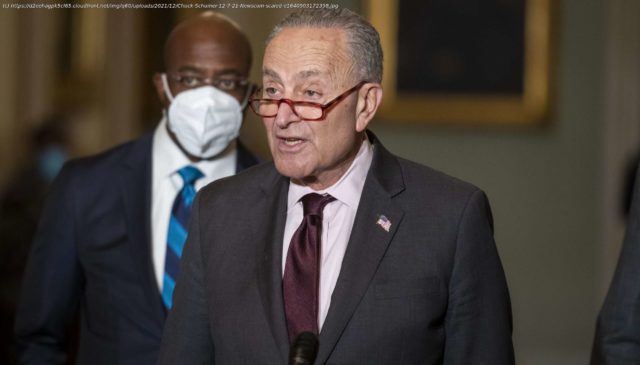Stranger still, the leading drug policy reform organization supported Schumer’s obstruction.
President Joe Biden this week signed into law the National Defense Authorization Act (NDAA) for fiscal year 2022. Although the version of the must-pass bill originally approved by the House included legislation aimed at promoting access to banking services for state-licensed marijuana businesses, those provisions were removed during negotiations with the Senate. This was the fifth time that the House had approved such legislation, and the latest bill, the Secure and Fair Enforcement (SAFE) Banking Act of 2021, had strong, bipartisan support in that chamber. It also was favored by at least 41 senators of both major parties. But Senate Majority Leader Chuck Schumer (D–N.Y.), a latecomer to marijuana reform who now says he wants to repeal federal prohibition, insisted that the bill be removed from the NDAA. Stranger still, the Drug Policy Alliance (DPA), which likewise supports marijuana legalization, joined Schumer in demanding that the SAFE Banking Act be excised. “ We have less than 72 hours to keep the SAFE Banking Act OUT of this omnibus bill and the only way to stop it is if advocates like you speak up right away,“ Maritza Perez, the DPA’s director of national affairs, warned in a December 3 „urgent action“ alert. „Don’t Let Congress Prioritize Marijuana Profits Over People,“ the header said. This puzzling turn of events illustrates a long-running debate about whether piecemeal drug policy reforms undermine efforts to achieve more fundamental and consequential changes. But it also shows how legalization is driving a wedge between erstwhile allies who agree that marijuana prohibition should end but disagree about how best to achieve that goal and what to do afterward. The clash pits House Democrats and many Democratic senators against the Senate leadership, and it brings to the fore ideological differences between progressives and libertarians who have long been united in opposing the war on drugs. The SAFE Banking Act, which Rep. Ed Perlmutter (D–Colo.) reintroduced last March, addresses a problem that has long plagued the cannabis industry. Because marijuana remains illegal at the federal level, financial institutions are reluctant to serve businesses that manufacture or distribute it, even when those businesses are licensed and regulated by the states where they operate. Under current federal law, even providing basic services like a checking account could expose banks to criminal charges, forfeiture, and potentially ruinous regulatory action. Their only protection lies with the enforcement discretion of federal prosecutors and regulators, whose policies and practices could change at any time. The chilling effect of that risk has left state-licensed cannabusinesses with few viable options for paying employees, covering other expenses, processing customer payments, paying taxes, or borrowing money. The result has been an excessive reliance on cash, which makes businesses more vulnerable to robbery, and various workarounds that can fail without any advance notice. The SAFE Banking Act aims to solve this problem by protecting financial institutions that serve „cannabis-related legitimate businesses“ from regulatory penalties such as loss of deposit insurance. It also prohibits regulators from instructing banks to terminate a licensed marijuana supplier’s account without a „valid reason,“ which cannot be „based solely on reputation risk.“ The bill says the revenue earned by state-legal marijuana businesses will no longer qualify as the proceeds of unlawful activity, meaning banks that accept such deposits are not implicated in money laundering. And it says providing loans or other financial services to state-licensed marijuana businesses cannot justify „criminal, civil, or administrative forfeiture.“ Perlmutter’s bill attracted 180 cosponsors in the House, including 26 Republicans. It passed the House in April by a vote of 321 to 101, with support from 106 Republicans. Perlmutter’s amendment adding the SAFE Banking Act to this year’s NDAA was approved by a voice vote in September. But then the SAFE Banking Act ran into a wall named Chuck Schumer. The Senate majority leader, who is working on a broader bill that would remove marijuana from the list of federally prohibited drugs, thinks his legislation should be considered first. KTVH, the NBC station in Helena, Montana, reported that Schumer and Sen. Cory Booker (D–N.J.), who is collaborating with him on the legalization bill, „wanted to hold off on the banking provision until a broader marijuana bill can be passed.“ They „said it’s important to make sure the eventual marijuana policy addresses restorative justice issues like decriminalization and expungement.“ Perlmutter was not pleased. „People are still getting killed and businesses are still getting robbed because of a lack of action from the Senate,“ he said in a press release.
Start
United States
USA — mix If Chuck Schumer Supports Marijuana Legalization, Why Did He Nix a Bill...






